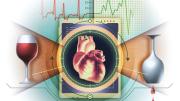A successful public health prevention program requires knowledge of factors that may increase the likelihood of maintaining health or developing a disease. Several different study types can be employed to gain a better understanding of such risk factors. Which study type is most appropriate depends on the question at hand; each study type has its own set of strengths and weaknesses.
Initial explorations of the relation between a suspected risk factor and a disease may include examining their correlations across several countries. For example, plotting estimated alcohol consumption per capita and death rates from coronary heart disease (CHD) against each other reveals that the population of Finland has low alcohol consumption but very high mortality from CHD. Conversely, the French have a high consumption of alcoholic beverages but one of the lowest death rates from CHD. What can we learn from these observations? Such ecological studies suggest that alcohol consumption may reduce the risk of dying from heart disease. But this picture could be distorted by other lifestyle factors correlated with alcohol consumption and also with CHD mortality. The Finns have a high consumption of saturated fat, which is associated with a high risk of heart disease, and the French have a diet rich in vegetable oil and fresh fruits and vegetables, which are associated with a low risk of heart disease—although the French do like their butter, too. So are these other dietary factors, rather than alcohol consumption, truly responsible for the differences in heart disease mortality? If so, they would confound the association between alcohol and CHD mortality. And then there is Japan: the Japanese do not drink much alcohol and they do not die from CHD! This observation confirms that the story is not straightforward and that other factors may play important roles in influencing or confounding the association of interest. A confounder is a third variable that is associated with the risk factor or exposure of interest and is itself a risk factor for the disease. We can think of many factors that fulfill these conditions and can therefore distort the association of interest. Our goal is, therefore, to exclude the influence of confounders. To do this we would need data on the individual level. And we need to be able to measure the potential confounders. We can then eliminate their influence statistically by holding their level constant in so-called regression models (which allow for the simultaneous adjustment of many confounding variables).
Adapted from The Harvard Sampler: Liberal Education for the Twenty-First Century, edited by Jennifer M. Shephard, Stephen M. Kosslyn, and Evelynn M. Hammonds, to be published October 2011 by Harvard University Press. Copyright © 2011 by the President and Fellows of Harvard College. All rights reserved.







